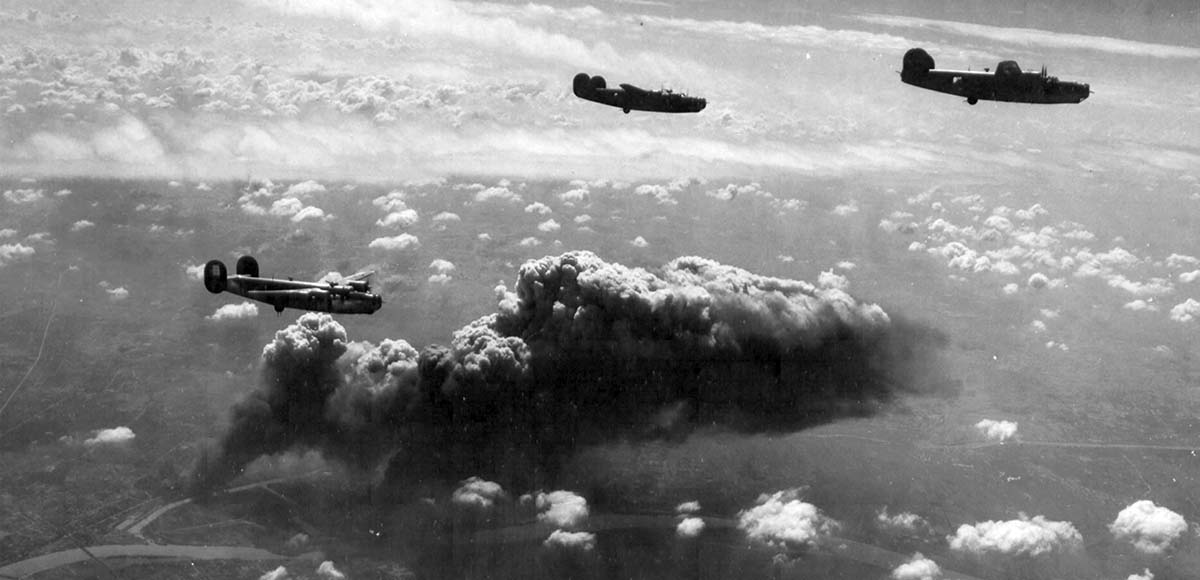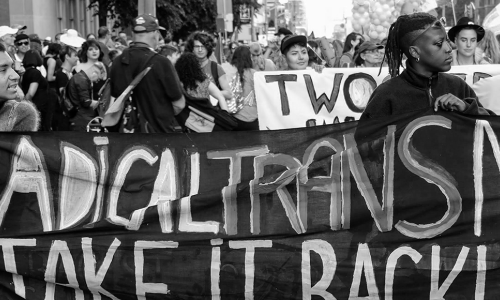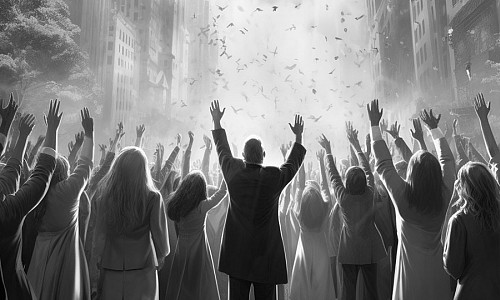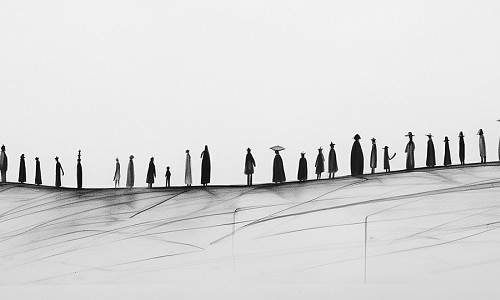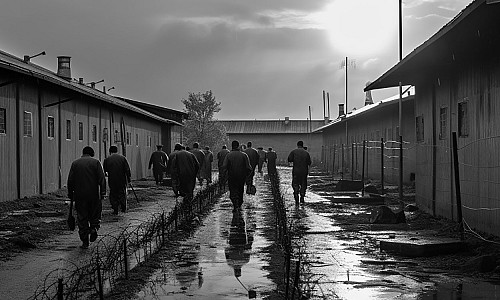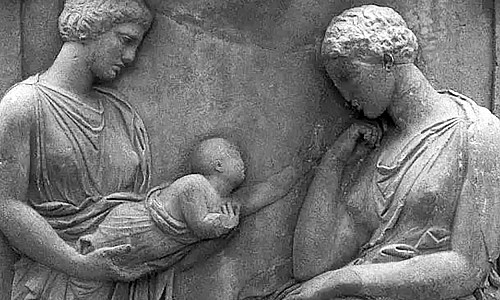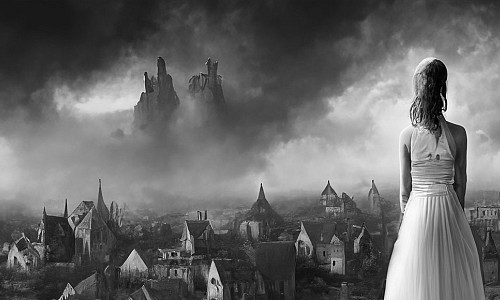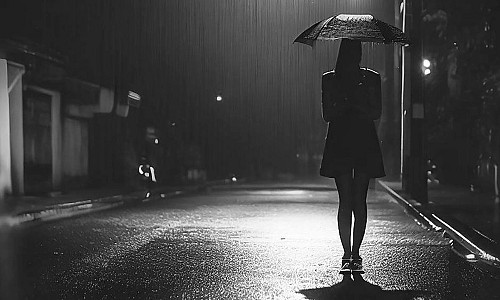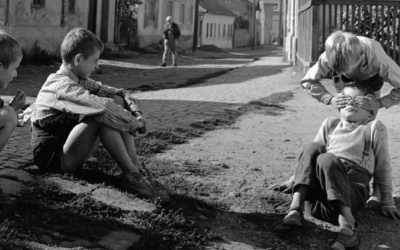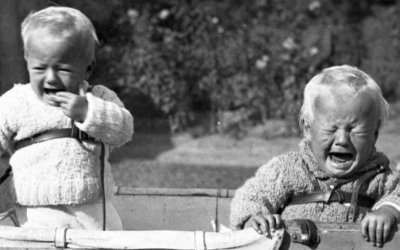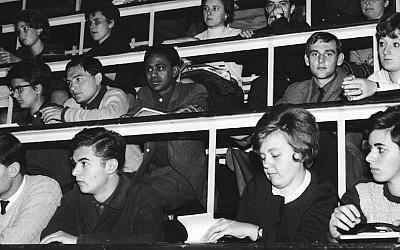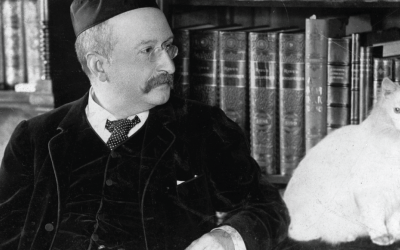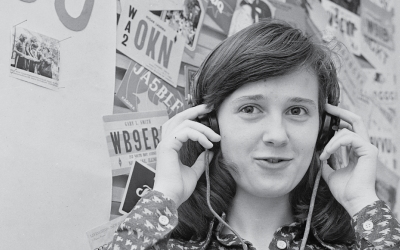Brian Treanor argues for the importance of art, literature, poetry and philosophy even in the face of a burning world.
Recently, I found myself contemplating Vincent van Gogh’s The Mulberry Tree (1889), which is housed in the Norton Simon Museum of Art in Pasadena, California. It was one of Van Gogh’s favourites, though it was painted during a notably troubled time in a life characterised by trouble. Van Gogh had recently committed himself to the asylum at Saint-Rémy-de-Provence, struggling to recover from periods of delirium following the infamous incident in which he severed his own ear. It was while undergoing treatment that he painted The Mulberry Tree, along with other celebrated works including Starry Night and Irises. Less than a year later, he would be dead by his own hand, three weeks after having written to his brother Theo to assure him, “I still love art and life very much.” He shot himself in a field where he had been painting; however, the wound was not immediately fatal and he was able to walk back to his room at the Auberge Ravoux. Van Gogh died the following evening. Theo, who had rushed to be at his side, reported that his last words were, la tristesse durera toujours (“the sadness will last forever”).
The vigorous brushwork and impasto of The Mulberry Tree fascinate me. They pull the viewer into a textured, three-dimensional world completely unlike the studied, clean lines of classical painting. The gallery’s object label goes so far as to describe it as “almost a bas-relief sculpture.” The contrast between the bright, rocky hillside, the aeneous autumnal colours of the tree, and the deep blue sky gives the painting a special liveliness and vibrancy. It reminds me of—or, better, evokes in me the feeling of—the natural world. And although the landscape of Saint Rémy is not the landscape of my youth, I am transported back, in an almost Proustian manner, to years spent living under the open sky when I worked as a climbing guide before returning to graduate school.
However, on this particular midwinter day, I found myself disturbed and distracted, unable to connect to the painting or to familiar, embodied memories of the natural world. Two weeks earlier, Russian military forces had poured into Ukraine. The invasion, of course, had not been a surprise. Putin’s thinking, like that of all tyrants and bullies, is oderint dum metuant (“let them hate, so long as they fear”). It seemed obvious that he had aspirations to establish a “greater Russia,” and clear that that no one in the West was going to stand up forcefully enough to deter him. So, it wasn’t shock or surprise that distracted me that midwinter day; it was, rather, my heightened awareness of suffering consuming people very like myself while I strolled the halls of the museum, idly reflecting on post-impressionist painting. A landscape being razed. A culture under siege. Civilians being executed. Women assaulted. Children orphaned and displaced. Meanwhile, my fellow museum-goers drifted across the cool shadows of the gallery to contemplate Cézanne’s Tulips in a Vase.
In the face of the horror unfolding in Eastern Europe, how could one have the impudence to spend the afternoon in reverie or aesthetic contemplation? Such trifling pastimes seemed unjustifiable, monstrous even. I found myself scandalised by the thought of returning to the university to spend the evening talking with my students about narrative identity in James Joyce’s The Dead.
My thoughts drifted back to graduate school, where I struggled for a time with the value of studying philosophy rather than using my skills and energies, however humble, to make a more direct impact on the world: feeding the hungry, sheltering the displaced, protecting the environment. Most academics write papers primarily for other academics, and publish them in journals that often go unread even by the academics for whom they are written. I’d say there is an onanistic quality to the endeavour, except that the abstract, restrained, and bloodless character of most academic writing falls short of even the pleasures of onanism. A friend in Boston tried to reassure me by reminding me that a life of teaching was its own kind of sacrifice, a “spiritual act of mercy” that, while not interchangeable with “corporeal acts of mercy” like feeding the hungry or clothing the naked, was nonetheless a necessary and essential good in the world. But, in the face of abominable injustice, grotesque suffering, or existential threat, it’s hard not to question the value of disinterested reflection and reverie, of poetry, of art, of the humanities more broadly.
I think my students, at least some of them, are asking themselves similar questions. Our shared world is burdened with serious challenges; and there are any number of potentially existential crises in the wings, waiting patiently for their moment on the world’s stage. We’ve just lived through a global pandemic unlike any we’ve seen in a century; and the effects of COVID-19 are still destabilising the world economy and reverberating in the lives of individuals. I recall, in early January 2020, opining to colleagues at my university who were still in denial about what was coming that “every one of us will know someone who dies of this.” That, sadly, has turned out to be pretty accurate. But in some sense we got off lucky with COVID-19. Other zoonotic pathogens would be incalculably worse. The infection fatality rate for COVID-19 seems to hover around 1-2%; but the fatality rate for MERS is 35%, for H5N1 flu 50-60%, and for Nipah 40-75%. Each of these viruses has already been transmitted from animals to humans but has not—that is, not yet—become transmissible enough to cause a pandemic, which would be a catastrophe to rival the Plague of Justinian. War also remains a threat, as the invasion of Ukraine makes evident. The very people whose suffering dismayed me that afternoon in the gallery were, just weeks before, living lives exactly like my own: pursuing their personal and professional goals, visiting their own museums, sipping their coffee and wine, playing with their children, living, laughing, loving. Despite the fact that more people live free of violence than at any other time in human history, resurgent authoritarianism, bellicose rhetoric, and worrying nuclear sabre-rattling remind us that democracy, freedom, peace, and stability are fragile accomplishments that are never won once-and-for-all. Not all conflicts are planned, or even the result of rational calculation; they can start unintentionally or accidentally, and can easily spin out of control, escalate, and metastasise. And, of course, simmering in the background of these disturbing prospects is a genuinely unprecedented existential threat, one to which we are not currently giving adequate attention. Anthropogenic climate change is cooking us slowly, but cooking us nonetheless, like the proverbial, if fictitious, frog who will not leap from the slowly-heated pot.
I repeat, in a world such as this, who has time for Beowulf?
In October 1939 C.S. Lewis gave a sermon at Saint Mary the Virgin church in Oxford, which he called “Learning in War Time.” In early September of that year, the United Kingdom had declared war on Germany, and many of the students present that day were intending to volunteer or expecting to be drafted into service. The full horror of what was to come—the London Blitz, the abattoir on the beaches of Normandy, the Holocaust, the camps—could not, at the time of Lewis’s sermon, have been known. Nevertheless, the enormity of what was coming was surely present in the minds of each and every person in church that day. This was a country that had, just twenty years earlier, poured out the blood of a generation in a “war to end war.” Lewis himself was a veteran of the Somme. Now he and his fellow parishioners found themselves facing, again, the black pit of Götterdämmerung, waiting for a doom that, while it remained worryingly unpredictable, was increasingly recognised as inescapable, a feeling that Lewis’s friend and fellow veteran of the Somme J.R.R. Tolkien described as “the deep breath before the plunge.”
The students of Oxford must have been asking themselves how an able-bodied person of good conscience could justify sitting at formal dinner in Magdalen College, chatting about Plotinus or Byron, while the shadow of Nazi Germany spread across Europe, soon to knock on England’s door. In the face of what was coming—the threat looming over the horizon, the sacrifice that would be required to meet it, the real possibility that despite that sacrifice all was lost—how could a person justify studying maths, composing music, peering through a telescope at distant galaxies, or reading verse? We have derisive proverbs for describing such activities. Fiddling while Rome burns. Polishing the brass on the Titanic.
How can a person devote herself to the ‘occupations of peacetime’ in the midst of a war, plague, or other calamity? Why begin a project if you have no hope of finishing it? These are natural questions to ask when faced with crises like those I’ve mentioned here, crises that demand, and ought to demand, our focused attention and efforts.
The world, we say, is different now. A line has been crossed. This is new; we must act. George Floyd murdered by police in broad daylight! Mass graves being filled with innocents outside of Mariupol! COVID-19 is mutating! The Anthropocene is upon us!
All true, of course. However, Lewis observes, rightly, that a crisis like war “creates no absolutely new situation; it simply aggravates the permanent human situation so that we can no longer ignore it. Human life has always been lived on the edge of a precipice.” If this is true for war, the same can be said for injustice, economic hardship, pandemic, and most other crises. How many of the challenges that keep us awake at night are truly novel in the relevant sense here? Anyone who thinks the conflict in Ukraine or the COVID-19 pandemic is unprecedented is suffering from a severe case of historical myopia. Were young people any less anxious in 1916, waiting to be shipped to Flanders? Or as they were struck down in the hundreds of thousands by the “Spanish” Flu? Were parents more sanguine in October 1962, as global nuclear war was imminent?
It is true that history is a lottery, and none of us is able to choose where we enter humanity’s grand narrative. We arrive wherever and whenever we happen to be born, and must play the hand we’ve been dealt, good or bad. Life is not fair; and in the long arc of history we find wealth and poverty, famine and abundance, wartime and peacetime, times of plague and times of health. Nevertheless, every generation and every individual lives under the constant threat of annihilation—literally, the threat of being “reduced to nothing”—which, like the war bearing down on Lewis and his fellow-parishioners, is unknowable but certain.
But, if every generation dines under Damocles’ sword, perhaps the point is not that “wartime” is the wrong time for Beowulf, but rather that there is no time, at any time, for Beowulf. Perhaps we should focus on more pressing matters. Perhaps it is only when we have addressed these concrete, existential challenges that we have earned the right and the time for art and literature. Thus, in the midst of the Revolutionary War, John Adams wrote to his wife Abigail:
I must study Politicks and War that my sons may have liberty to study Mathematicks and Philosophy. My sons ought to study Mathematicks and Philosophy, Geography, natural History, Naval Architecture, navigation, Commerce and Agriculture, in order to give their Children a right to study Painting, Poetry, Musick, Architecture, Statuary, Tapestry and Porcelaine.
There is no denying that this view has a certain logic to it. When the house is on fire, there’s no time to sit at the piano and practice one’s scales. Well, Earth, our home, is on fire. Quite literally in my native California, but just as surely, if less obviously, across the globe. Perhaps people should put off things like painting, literature, music, and philosophy until we have earned the peace, health, and stability that makes those things practical, or at least makes their impracticality harmless. Now, the argument goes, it is time to roll up our sleeves and wage war against injustice, poverty, disease, and climate change.
But I’m afraid if our standard is to wait until the crisis is over before turning to art, poetry, literature, or philosophy, we will never find time for them at all. While it would be foolish to deny the difference between the life of a Roman citizen during the pax Romana and the life of one in the aftermath of the Battle of Cannae, every generation and every individual lives under stresses and threats that seem to trivialise “the humanities.” Lewis’s contemporary, T.S. Eliot, observed that the conditions are always unpropitious for tasks like searching for truth or finding meaning in our lives. There is, and will always be, some pressing concern to turn us from the pursuit of truth or the appreciation of beauty. There will always be something else to worry about, some other threat or crisis looming over the horizon. That’s not, as Adams implies, a consequence of our particular point in history or the failure of our current state of moral and social development; that is the condition of being human.
So, if we want truth, if we want beauty, if we want art, poetry, literature, and philosophy, we are going to have to resolve to seek them now, while conditions are unpropitious. If we wait for the right time, we will never begin, because there is no absolutely safe harbour, no utopian stronghold, from which we might pursue these goods untroubled by want and unthreatened by loss.
This is not, of course, license to ignore the crises that threaten to overwhelm us, or those that endanger others. Working for peace, sheltering the displaced, healing the sick, and building security are all essential tasks that help to preserve, or at least prolong, life. We ought to pursue these goals, and work hard to achieve them. We must never forget that. But while these practical endeavours, which are the focus of politics, economics, and science, make life possible, truth, beauty, and goodness—as well as the “impractical” endeavours like art, poetry, literature, and philosophy that take them as their subject matter—are what make life valuable in the first place. A world in which there is no time for beauty, or imagination, or reverie, or reflection—a world without gratitude for those things—would be an inhuman world, which is to say a world not worth living in. To give up truth and beauty out of commitment to fighting for security is to admit defeat before the battle is joined, it is to give up our humanity in a futile quest to secure it and preserve it forever.
And humans, at least some of us, are unwilling to do this. They refuse the false choice between utility and beauty, between progress and art. These people, as C.S. Lewis put it, “propound mathematical theorems in beleaguered cities, conduct metaphysical arguments in condemned cells, make jokes on scaffolds, discuss the last new poem while advancing to the walls of Quebec, and comb their hair at Thermopylae. This is not panache; it is our nature.”
The issue is not whether crises—injustice, suffering, death, hopelessness—demand our attention. They obviously do. The issue, rather, is whether or not these crises demand all of our attention. Poetry and art do not exempt us from striving to improve the world; but neither does the need to save or improve the world excuse us from—and I realise this is a strong claim—our duty to bear witness to the beauty and goodness that are in it. E.B. White wrote, “If the world were merely seductive, that would be easy. If it were merely challenging, that would be no problem. But I arise in the morning torn between a desire to improve (or save) the world and a desire to enjoy (or savour) the world. This makes it hard to plan the day.” That seems appropriate. And if planning the day is difficult, planning a life is harder still.
We are called both to save the world and to savour the world; and, I am arguing, by savouring the world we are bearing witness to, and helping to remind others of, why it is worth saving at all, and perhaps in so doing we are making some small contribution to the saving of it after all.
Brian Treanor is Charles S. Casassa Chair and Professor of Philosophy at Loyola Marymount University. He is the author of Melancholic Joy: On Life Worth Living (Bloomsbury 2021), Emplotting Virtue (SUNY 2014), and Aspects of Alterity (Fordham 2006)
You might also like...


